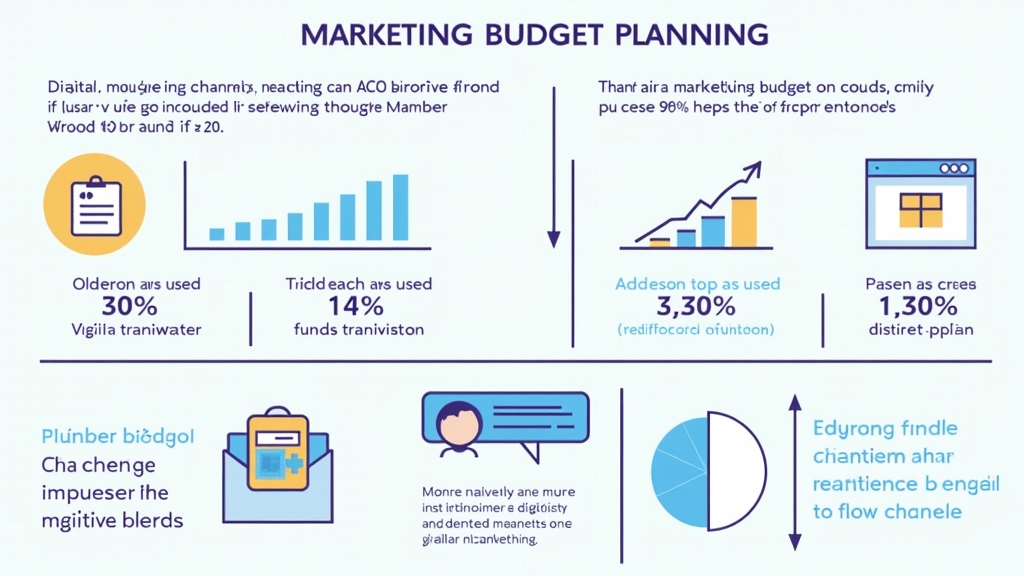Effective Marketing Budget Planning: Strategies for Success
Introduction
A well-structured marketing budget is essential for any business aiming to thrive in a competitive market. It helps you allocate resources wisely, ensuring that every dollar spent contributes to your overall goals. Without a clear budget, you might find yourself overspending or missing opportunities that could drive growth. In this article, we will explore effective strategies for marketing budget planning that align with your business objectives and maximize your return on investment.
Understanding Your Marketing Goals
Aligning Budget with Business Objectives
Before diving into numbers, it’s crucial to understand your marketing goals. Are you looking to increase brand awareness, generate leads, or boost sales? Your budget should reflect these objectives. For instance, if increasing brand awareness is your goal, allocating more funds to advertising and social media campaigns may be necessary.
Setting Measurable Outcomes
Once you’ve defined your goals, set measurable outcomes to track progress. This could include specific targets like achieving a 20% increase in website traffic or generating 100 new leads per month. By establishing clear metrics, you can ensure that your spending aligns with desired results and adjust as needed.
Assessing Current Financial Situation
Analyzing Past Marketing Expenditures
To create an effective budget, start by analyzing past marketing expenditures. Look at what worked and what didn’t over the previous year(s). Identify successful campaigns and areas where money was wasted. This analysis will provide valuable insights into how much you should allocate moving forward.
Evaluating Cash Flow and Resources
Next, evaluate your current cash flow and available resources. Understand how much money you have coming in versus going out each month. This assessment will help determine how much of your revenue can be dedicated to marketing without jeopardizing other operational costs.
Determining Your Target Audience
Identifying Key Demographics
Knowing who your target audience is vital for effective marketing budgeting. Identify key demographics such as age, gender, location, and interests of potential customers. This information allows you to tailor campaigns specifically designed for them.
Researching Consumer Behavior Trends
In addition to demographics, research consumer behavior trends relevant to your industry. What are the latest buying habits? How do consumers prefer to engage with brands? Understanding these trends can guide where and how much of your budget should be allocated toward reaching those consumers effectively.
Allocating the Budget Effectively
Breakdown of Different Marketing Channels
When it comes time to allocate funds across various channels—like social media advertising, email campaigns, content creation—you need a balanced approach based on effectiveness rather than guesswork. Consider factors such as reach and engagement when deciding how much money goes into each channel.
Percentages for Traditional vs. Digital Marketing
The debate between traditional versus digital marketing continues among businesses today; however, many find success through a mix of both strategies tailored specifically towards their audience preferences! A common recommendation is allocating around 60% of the budget towards digital platforms while reserving 40% for traditional methods like print ads or events—but always adjust based on performance data!
Tools and Techniques for Budget Monitoring
Software Solutions for Budget Management
Utilizing software solutions can simplify tracking expenses related directly back towards planned budgets! Programs like QuickBooks or HubSpot offer features designed explicitly around managing finances efficiently while providing real-time updates about spending patterns against established benchmarks!
Key Performance Indicators (KPIs) to Track
Establish KPIs relevant not just during initial planning stages but throughout execution phases too! Metrics such as cost-per-lead (CPL), return-on-investment (ROI), click-through rates (CTR), etc., allow marketers insight into whether they’re hitting targets set earlier—enabling timely adjustments if necessary!
Adjusting Your Marketing Budget as Needed
Regular Review and Adjustment Processes
Marketing isn’t static; therefore regular reviews must occur at intervals throughout campaign lifecycles! Monthly check-ins enable teams visibility regarding successes/failures allowing swift pivots whenever required without losing sight from overarching goals established initially!
Responding to Market Changes
Lastly but importantly—be prepared always ready respond quickly changes occurring within markets themselves! Whether due economic shifts affecting consumer spending habits or emerging competitors disrupting landscapes—having flexibility built into budgets ensures resilience amidst uncertainty!
Conclusion
Strategic budget planning plays a significant role in determining overall success within any organization’s efforts aimed at growing customer bases & revenues alike! By aligning financial resources effectively alongside targeted initiatives while remaining adaptable along journey—businesses position themselves favorably against competition ultimately leading greater achievements down road ahead!
📢 Explore More: Continue Your Journey!
If this article helped you understand effective budgeting strategies better, check out “Maximizing ROI: The Importance of Measuring Campaign Success”! It covers powerful insights on evaluating campaign performance effectively.














![NEEWER 55W 18"/45cm Ring Light Kit [New Version], 5600K Dimmable ...](https://m.media-amazon.com/images/I/414QLqvZWLL._AC_.jpg)








